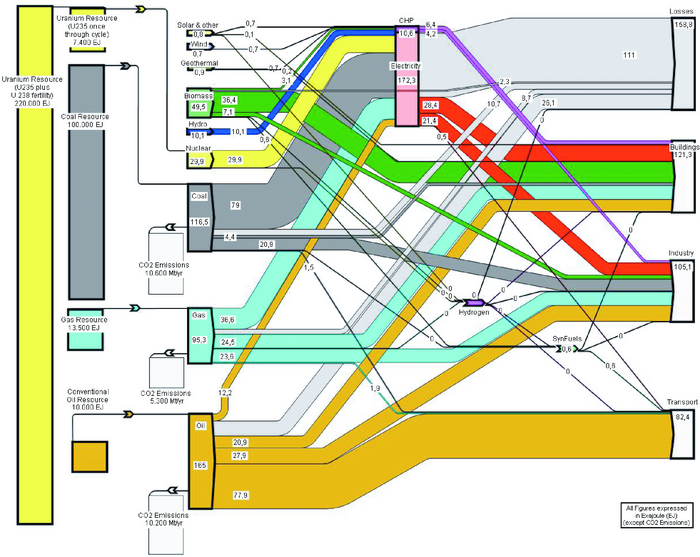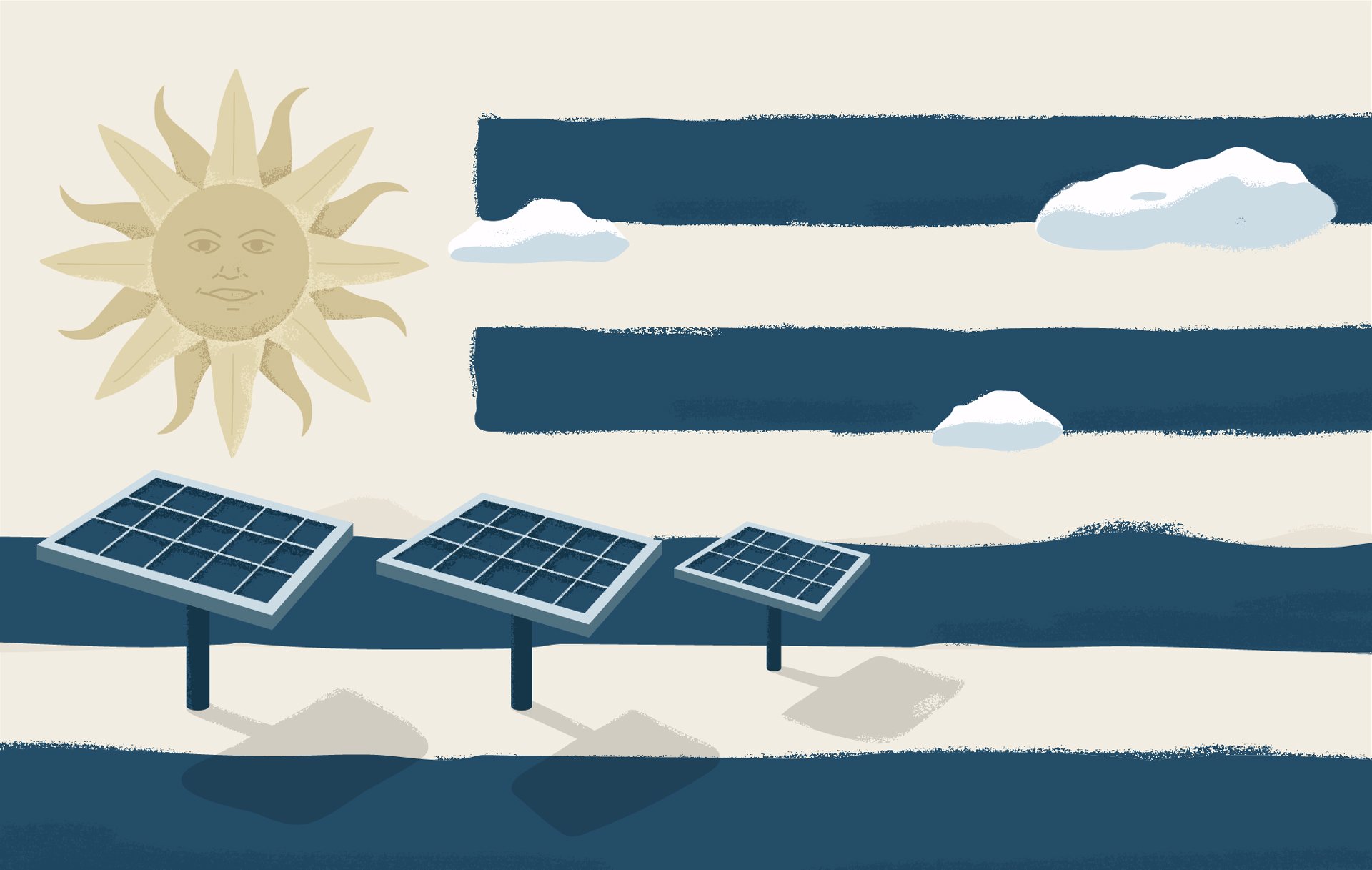“with wind the single-biggest contributor… Power production costs have declined “by almost half” … And the clean energy sector has created 50,000 new jobs… Ask me what was the impact on the electricity sector in Uruguay after this tragic war in Europe — zero.”
I actually never thought of it like that, if you’re not partaking in the trade of fossil fuels, you are removing yourself from a lot of potential conflicts and “who support who” ordeals.
One of the main reasons the big players want (or even need) as many people globally to remain dependent on it as possible - control.
Yep, lock the victim nations into a petroleum payment plan
Yes, I think that one of the side effect of the war in Ukraine will be a big increase of renewables energy in Europe.
European countries started to realize how fragile their energy supply is and how dangerous it is.
Wait until we have our first Wind War.
That’s what we call it after eating beans all day
We’ll control the wind and rain. It was a saying in soviet block during cold war and elites really thought they would. By spraying chemicals in clouds etc. Disgusting.
Cloud seeding? That’s very much a real thing, although its effectiveness is disputed.
A bit of info about an “experiment” on the subject https://en.m.wikipedia.org/wiki/Operation_Popeye
…Except China, where most renewables are produced.
Except once you have the turbines and panels, you don’t have to keep importing resources to run them. Sure, you might need parts for maintenance, but if things go south it’s a lot easier to reverse engineer parts than to find new oil suppliers.
Only because they produce them the cheapest and in the largest quantities (which goes hand in hand).
Basically any country can produce solar panels and wind turbines. Both technology and resource wise.
deleted by creator
We’ve been at ~95% renewable for years actually, but now we’ve reached 100%
How do you cope when there is cloudy without wind?
There are ways to store the power generated by renewables.
There are, but none is feasible today when it comes to mass storage. Or is there one?
There is actually. Pumped Storage hydro uses the energy as it’s generated from renewables and uses it to pump water up into a reservoir. Once you have the water pumped, it’s just a matter of letting the water back out through turbines. Their efficiency is somewhere around 80% which is pretty good.
For that you need both suitable hills and water. Also it’s not that huge, it certainly depends on the reservoir capacity. If it was a feasible solution, then you’d see them everywhere, but you don’t. Ask Germans about it.
Meanwhile in South Africa, we’re having blackouts while being almost completely dependant on coal.
I remembered reading many years ago about large solar plants in SA and I wondered what happened to that. Apparently Zuma happened: From a world leader in renewables, to years behind, thanks to Zuma and his cronies.
But I bet the companies make a lot of profit on that, so all good \s
Yep they kick back to the politicians so perfectly to plan
You know you need a lot of sun and wind for renewable energy?
Pretty sure South Africa has too little of it unlike those sunny and wind torn countries like, don’t know… Germany?
Looks like that’s just the grid? I’m sure there’s more to go for transportation and eliminating the need for generators and gas, but this is a great start!
does anyone ever assume that it’s anything other than the grid when it comes to some article like this?
electricity is’t the majority of the energy consumed in nearly any country.
it’s a easy way to keep confusing less vigilant people by calling electricity as energy.
Just call things the way they are.
You’re right; 2/3 of worldwide energy is actually waste heat.
https://www.businessinsider.com/most-energy-still-comes-from-oil-2015-10
Here’s the chart from 2007: Waste heat / losses are in the top right, although it doesn’t show the transport sector losses which are higher than for coal generation.

What this means is that when we fully electrify all sectors, by using renewable energy such as wind and solar, our total energy generation capacity will only need to be about 1/3 to 1/4 of what we currently produce today to fulfill our current energy needs. That’s huge.
Correct me if I’m wrong, but electrifying a process doesn’t automatically make it not produce waste heat, right?
The reference to waste heat could include the heat from burning fossil fuels that isn’t turned directly into work. Which is a lot.
So you’re right, there will still be some waste heat and the reduction in production needs won’t be that drastic. But it’s still a significant chunk of the total!
Yes of course, but a lot of energy is currently also used for heating things in cooking steel, chemical industry, concrete, etc. Those processes need energy as heat and directly produce waste heat. I agree it’s probably still significant. It’s just wrong to reduce energy consumption to “making things move”.
Converting energy to power will always produce at least one of heat or light (also radiant heat) in the process.
There is no 100% efficient power.
But, electric is the closest you could get. Especially compared to any petroleum products
Changing your energy generation from burning something to turning a turbine with wind power, hydropower or geothermal power. Or just using solar, means that you have no waste heat for electrical generation.
Waste heat is only created when you burn a fuel to boil the water.
If you heat things electrically you still generate waste heat. Think electrical stove and its bigger industrial counterparts.
that’s not quite right and mixes couple things
you have production losses and transmission losses. then you have waste heat used for household and industrial heating.
now you would also have to produce that portion electrically.
For instance in winter heating requirements of a typical house are 2x that of the electricity used.
I mean I doubt any reasonable person would think that literally every household in Uruguay has replaced their gas stove with an electric/induction stove and that they use only AC/heat pumps and everyone has switched to an electric car and every bus has been converted to a trolley and or Battery/Hydrogen Electric
and a bunch of other stuff.
Too bad it’s far too late.
Amazing
53,000 barrels/day
It looks like Uruguays oil consumption has flatlined since about 2014. I can’t find any newer data than 2016 but here’s my source:
i think evs are still too expensive for the common uruguaian(?) wallet. so they still use oil for cars. but 4 months 100% renewables is great news.
Presumably mostly for transportation sector. EV adoption should lower that.
Indeed, I have some friends who live in South America and they tell me that electric scooters and three wheelers are becoming very popular. Imported from China.
how those middle east prince now can buy more hookers and supercars if u guys not using oil
Very cool. I hope they are looking at reducing demand for power as much as increasing production.
Actually, with clean sources of electricity like wind and solar, the amount consumption doesn’t matter. It only matters if there isn’t enough for everyone, or the power comes from non-green sources (coal etc)
I don’t understand the objection to greater efficiency… Even renewables are not without their own environmental costs of mining, transportation, manufucaturing etc. If we use less power we can more easily transition to renewables, with less disruption to the environment.
You’re right! There’s nothing wrong with efficiency and teaching people to be less wasteful, however I believe including it in your argument for renewables means muddying the message.
Talking about getting production to 100% renewable puts the onus on governments and power companies to change.
Talking about efficiency is about getting consumers to use less, and allows energy producers and politicians to point the finger at people leaving their lights on unnecessarily rather than getting on with the job of making more renewable energy.
This is of course speculation on my part
Efficiency doesn’t have to be consumer led, though. It could be stuff like higher building standards and subsidies for insulation, subsidies for heat pumps for AC and hot water, even seemingly trivial things like free/subsidised LED bulbs can add up (there is still a significant amount of non-LED bulbs in the wild in many countries).
Nuclear fanbois: GASP! How dare you?!
Well, not every country has wind farms or water turbines as viable option. You know, geography and stuff…
I am not intending to add fuel to this fire of a comment thread, however I was wondering if Stockholm, Sweden’s solution of burning culled rabbits, for fuel, would be considered ‘reneweable energy’?
deleted by creator
My country of Belgium. Unless by “100 % renewable” you include fossile gas generation “offset” by summer’s overproduction (which would be disingenuous).
Middle of January: 100% overcast for weeks on end with only 8 hours of daylight, some days with little to no wind. Geography does not support more hydro or any geothermal generation. Country is way too densely populated for meaningful biomass fuel production (not that it is a climate-friendly practice anyway).
Maaaybe there is a stretch argument to be made about offshore wind/water, but we have relatively little coastline and very busy waterways due to having some of the busiest shipping ports of Europe, so I doubt even in the most optimistic scenarios this can fill the gap during the winter season.
For any meaningful definition of the concept, we can’t be 100 % dependent on nationally-sourced renewables until we figure out much much denser and cheaper long term storage solutions. Which is alright - maintaining existing nuclear reactors is an option (barely due to legaislative sabotage pushed by the “greens” but a couple gigawatts is nothing to scoff at) and more importantly we are part of the EU which will hopefully allow us to buy southern European solar/wind via HVDC lines in the future, and we’re already very dependent on French nuclear. (Also we don’t have to be 100 % independent to push for renewables, perfect mustn’t be the enemy of good and all that)
allow us to buy southern European solar/wind
Yeah, I think this is the future for small, densely populated countries without clear sources of renewable energy
deleted by creator
Doesn’t Belgium just import electricity from the European energy grid? You guys have access to Norwegian hydro, German coal, and French nuclear.
Yes, in rather large amounts since we aren’t always self-sufficient (even with fossil gas).
Almost all of continental Europe is part of one, synchronous grid. Right now I’m using electricity simultaneously being produced in Belgium, Portugal, Ukraine, Turkey, and even Morocco; although for accounting purposes we calculate the difference at the border, electrons don’t care.
deleted by creator
You intentionally ignored the part about being overcast for weeks during the winter, the time of the year where they need the most energy. Tell me how solar can heat up the entire country when it’s overcast and there are only 8 hours of day light, which reminder, is covered by the overcast weather that stays for weeks
deleted by creator
I think you are forgetting on part of the message.
Sure on average over the year you can produce enough electricity, but how do you heat houses in december, January and February when there is almost no sun ?
deleted by creator
Vatican City /s
I think that there are constraints for certain countries, but the majority probably could. And when they can’t, it should be solved by cooperation and trade, IMHO.
Then maybe those countries shouldn’t exist.
Though that’s based solely on your example.
I don’t understand the nuclear energy hate. Of the nonrenewables it is the cleanest, and it is not always possible to run 100% renewable, (they depend on natural factors such as sun or wind), while nuclear is constant and always producing. Look at Germany and how it is polluting using gas and fossiles, it would be a million times better it they used nuclear energy.
Nuclear is just not practical. Even if you discount the risk of severe impact if anything ever goes wrong, and the long term impact on the environment if the fuel and waste chain. we’ve countless case studies that it’s just too expensive, too complex to build, too much putting all your eggs in one basket.
Making up some numbers but I think the scale is right …. Which would you choose:
— $12B and 10-20 years to build a nuclear plant, requiring highly specialized fuel and employees.all or nothing: you get no benefit the whole time it’s under construction so payback is multiple decades. Given the specialty fuel, employees, security, it’s the most expensive choice to operate
— $1B and 10-12 years to build a wind farm, but you start getting income as soon as sections come online. Fuel cost is zero and one being out for maintenance has negligible impact in production/profit. You get payback practically as soon as the project is built and it’s all gravy from there
Adding to this, while the wind doesn’t always blow, and the sun doesn’t always shine, nuclear needs water to evaporate. In a world where droughts during summer get ever more common, nuclear/coal is not the 24/365 solution it once was. The future has to rely on a diverse mix of different energy sources, if it wants to be resilient.
Coal is not affected by droughts, though. Nuclear for better or worse is the most reliable and clean source we know today. Biggest hurdle with renewables is storage. Let’s see if hydrogen is the way. But then again, storing large quantities of hydrogen might result in a big boom of something goes wrong.
AFAIK coal power plants often(always? Idk) use steam to drive their turbines in order to generate electricity. I’m not arguing against nuclear, but for a very diverse mix. Warm dry summer -> solar. Rainy dark winter -> hydro & wind. If we keep burning fossils, including nuclear, until we can switch to 100% renewals, I’m okay with that. The big advantage of renewals is the comparatively low cost of phases where no electricity is produced. A solar farm doesn’t generate cost at night. Coal and nuclear plants can’t just be “switched on and off” at will, and if they don’t produce, still need a lot more attention. But for the meantime, they are necessary, until we either overbuilt so much renewables to cover for “no wind/sun/rain” situations, or get some storage solutions (batteries, hydrogen, biofuels,…) Implement on a large enough scale.
That steam is closed circuit though. But yes, they need cooling water and perhaps pollution cleaning water. So I guess they are affected by droughts as well.
It’s a good energy source in principle and Germany definitely should have let their reactors run longer, but it’s just too damn expensive to build new ones. I’m not aware of any serious private installations of nuclear that are being built right now. One small modular reactor company in the US recently announced they will need twice as much money as previous estimated to build one.
Meanwhile, a ton of people and companies are building solar and wind everywhere.
Even worse, they prematurely closed their nuclear power plants, even recently. 🤦♂️
You seem to be the type of person that doesn’t understand that you just can’t easily decide from one day to another to keep nuclear power plants online, that where decided to go offline soon over 10 years ago. Supply chains already adapted, technically necessary inspections weren’t performed because it would soon shut down etc. You just cant easily revert a plan to turn off all nuclear power plans by a certain date from 10 years ago just days or weeks before that date.
Did I ever say that, though? Global warming didn’t happen yesterday, it’s well known for decades. The decision to close npps in first place wasn’t very clever, not revoking the decision later was even worse (I don’t know what was the last possible date to revoke it, I admit - but it’s not easy is a bad excuse). This brilliant plan is resulting in huge pollution while having plenty of renewable sources and spending a ton of money on those.
Edit: grammarYeah in a perfect world, Germany would have kept their npp and phased out coal first instead but it’s not a perfect world sadly and considering the npp operators were heavily campaigning against renewables Germany probably wouldn’t have invested that much in renewables if npp weren’t phased out. The only problem now is that Germany didn’t keep their momentum for investing in and expending renewables
Decades and decades of fossil fuel company FUD about nuclear that they managed to get the greens to buy into a long time ago.
No, not FUD. it’s the radioactive waste issue. And enormous expense.
And a security issue. Think of the mess if war/terrorism comes home and adversaries starts blowing them up.
deleted by creator
But the issue is you still need something for when the sun isn’t shining like what happens every night, and when the wind isn’t blowing, which can also happen at night. What will power everything during that time? Nuclear can be the backbone that keeps things running when renewables aren’t keeping up with demand. Sadly we can’t fully rely on renewables, and between having gas and coal as the backup or nuclear as the backup, I’d prefer a billion times nuclear over the other option
deleted by creator
I’d be willing to bet most people you’d categorize as “nuclear fanbois” would be perfectly happy if hydroelectric was providing 65% of the grid power.
The problem is that that renewables are pushed as a “one size fits all” solution that they really aren’t.
deleted by creator












